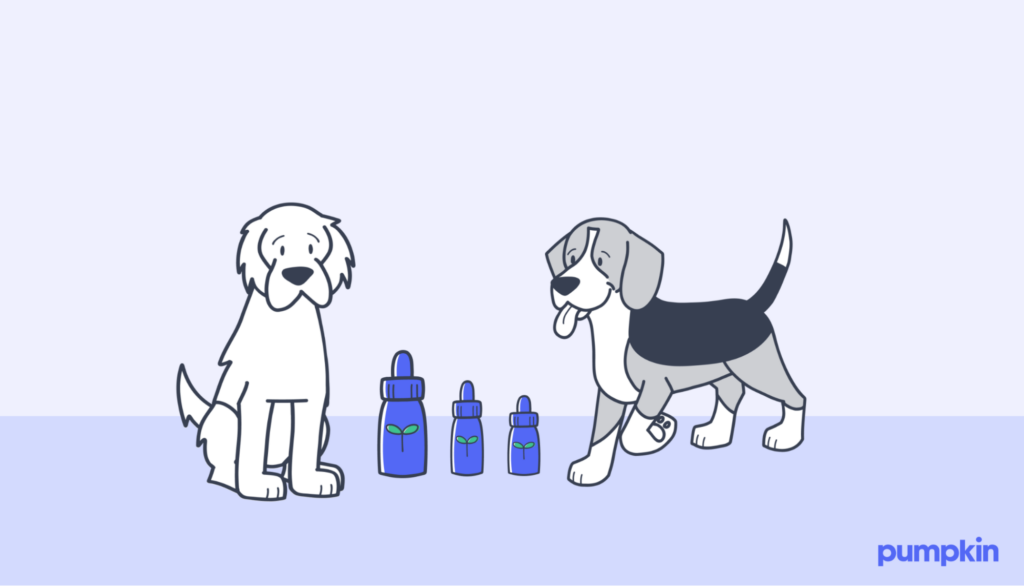Key Points
- A few essential oils are safe for dogs but many are toxic, including tea tree, cinnamon, and eucalyptus oil.
- Essential oils can be poisonous for dogs if ingested; the smell can also be overpowering, and hot oils can burn them.
- Symptoms of essential oil poisoning include breathing difficulties, drooling, difficulty walking, irritated eyes, and vomiting.
- Contact your vet or a pet poison helpline if you think your pup may have essential oil poisoning.
If you love aromatherapy, then essential oils can have an immediate effect on your mood, from calming you down to promoting better concentration. Since they’re so widely used by us humans, you may be wondering if they have the same benefits and therapeutic effects for our dogs. Unfortunately, the risks of essential oils for pets may outweigh the benefits.
Essential oils and dogs are a complicated mix, and many popular essential oils are never safe for dogs. In this guide, we’ll break down what you need to know before diffusing your favorite scent around your furry friend.
What are essential oils?
Essential oils are liquids made by pressing, distilling, or steaming plant parts such as fruits, tree bark, or flowers to obtain fragrance compounds. It actually takes a large amount of plant matter to make one bottle of essential oil, so some essential oils are mixed with other ingredients to create the final product. Single-ingredient essential oils wholly extracted from plants are labeled ‘pure.’
Essential oils have a strong and highly concentrated scent, which makes them great for aromatherapy. Aromatherapy is an ancient holistic technique that uses scents to promote healing, relaxation, or concentration in the mind and body. Practitioners believe that particular scents can soothe pain, help with insomnia, and boost focus. For example, lavender essential oil is commonly used in aromatherapy to reduce stress and anxiety.
Essential oils are also used for medicinal purposes. Tea tree oil has well-known antibacterial and anti-inflammatory properties and is commonly used in shampoos to treat dandruff.
We’re not going to dive into the debate on the effectiveness of essential oils or aromatherapy. Instead, let’s focus on the topic at hand (or paw): essential oils and pets.
Essential oils and pet safety
If you love your essential oils, you may want to use them to help your dogs, especially if other treatment methods haven’t been working.
In a few cases, essential oils may be an effective home remedy for certain canine skin issues. However, they should only be used sparingly, with your veterinarian’s approval, and with great caution. That’s because many essential oils pose serious risks for dogs.
You should always talk to your veterinarian and do your research before attempting to use essential oils as home remedies for your pooch.
Pet Pro Tip: Illnesses won’t wait to happen. It’s never too early to enroll in pet insurance. From common parasite infections, to costly hereditary illnesses, pet insurance can be worth it and can cover crucial eligible treatment your pet may need for their unexpected accidents and illnesses. Find out how pet insurance works, what pet insurance covers, and choose a plan today.
Reasons why essential oils and dogs don’t mix
Essential oils are called “natural” because they come from plants, and it’s tempting to think that “natural” means “safe.” But this isn’t always the case. Garlic is perfectly natural, but it’s also poisonous to dogs.
Below are three reasons why your pup should steer clear of essential oils:
1. Some essential oils are poisonous for dogs if ingested
Many common oils like peppermint, ylang-ylang, and tea tree oil are poisonous for dogs when ingested. Many plants are poisonous for dogs, and essential oils are just pressed plant oil. This means even a small lick of a calming essential oil can cause major tummy troubles for your furry friend. In large amounts, it could mean a trip to the emergency vet.
Never leave essential oils out in the open where they can be eaten by a curious pup, and never apply essential oils directly to your dog’s body.
2. The strong scent can be overwhelming for pups
Beyond this, the power of essential oils lies in their scent, which is why it’s tough to use them with dogs. Dogs have acute senses of smell that are much stronger than ours, so even a few drops of essential oil could be overwhelming. This overpowering smell will agitate your dog and possibly upset their breathing or central respiratory system. This can have serious consequences for their health.
3. Hot oil is not safe for your pooch
Many oils need to be heated to release their scent, and burning hot oil is a big no-no around our pets. If hot oil spills on them, your pup can get a painful burn. If you’re heating your oils around dogs, keep it firmly out of reach of any prying snouts and paws that could knock it over.
What essential oils are safe for dogs?

Some limited studies do show possible benefits of aromatherapy for dogs, but this remains a topic of debate. In one recent study, rosemary and peppermint essential oils were associated with stimulating properties, and shelter dogs exposed to the scents displayed increased activity levels. However, calming scents like lavender and chamomile did not produce a calming effect in the same dogs. So, don’t expect your dog to react to essential oils the same way that you do.
We won’t name the best essential oils for dogs, and we encourage you to talk openly with your veterinarian before trying any home remedies, including aromatherapy. Some popular essential oils among pet parents include:
- Chamomile oil
- Lavender oil
- Lemongrass oil
- Rose oil
To use essential oils safely for aromatherapy, it’s important to dilute them appropriately. We’ll also say this one more time: Due to the risks of accidental ingestion and overwhelming your dog’s sense of smell, we recommend talking to your vet before using essential oils for dogs.
What essential oils are harmful to dogs?
Do thorough research on the safety of an oil before using it around your dog. Here are some common essential oils that are toxic to dogs:
- Cinnamon
- Citrus
- Clove
- Eucalyptus
- Juniper
- Peppermint
- Pine
- Tea Tree
- Thyme
- Wintergreen
- Ylang Ylang
How do I know if my dog has eaten essential oils?

If your dog has eaten a toxic essential oil, there will usually be obvious signs. Look out for the following symptoms of essential oil poisoning:
- The smell of the oil on your dog’s fur and breath
- Redness in and around their mouth
- Breathing difficulties
- Drooling
- Fatigue
- Difficulty walking, or muscle tremors
- Agitation
- Pawing at their mouth or face
- Watery or irritated eyes and nose
- Vomiting
If you know your dog has consumed essential oils — or they’re showing signs of essential oil poisoning — you need to seek help immediately. Take your dog to your nearest veterinarian or emergency veterinary hospital. You can also call the ASPCA Animal Poison Control helpline or the Pet Poison Helpline, which are both available 24/7.
Your vet may perform a physical exam and run a blood test to measure your dog’s level of toxic ingestion. Take the oil product with you to the vet to help them understand what they’re dealing with. They may try to help your dog breathe with oxygen support, insert an IV drip, or otherwise try to remove the toxins.
How can I keep my dog safe around essential oils?
Even if you don’t use them on your dog, you may have essential oils around your house. Here are some key tips for keeping your pup safe:
- Keep lids tightly closed on all oil bottles.
- Keep bottles safe and out of reach of your pet, either locked away or in a pet-inaccessible location.
- When burning oils, including in essential oil diffusers, don’t put them on surfaces pets can easily reach.
- Thoroughly clean surfaces that essential oils have touched.
Essential oils for dogs: Just a whiff
It’s possible to use some essential oils safely with your dog, but there are many risks to consider. We recommend that pet parents avoid essential oils until they can consult their vet. Your pup — and their superpowered nose — will thank you.
As your dog grows up, accidents can happen. With Pumpkin Dog Insurance plans, you can get help paying for eligible vet bills in the future, which lets you focus less on cost and more on care.
FAQs
- https://pmc.ncbi.nlm.nih.gov/articles/PMC10905622/
- https://www.webmd.com/balance/stress-management/aromatherapy-overview
- https://www.webmd.com/vitamins/ai/ingredientmono-838/lavender
- https://www.mayoclinic.org/drugs-supplements-tea-tree-oil/art-20364246
- https://www.researchgate.net/publication/376194083_Composition_Bioactivities_Safety_Concerns_and_Impact_of_Essential_Oil_on_Pets'_and_Animals'_Health
- https://www.cabbagetownpetclinic.com/blog/february-2020/how-do-essential-oils-affect-your-pet
- https://vcahospitals.com/know-your-pet/essential-oil-and-liquid-potpourri-poisoning-in-dogs
- https://pmc.ncbi.nlm.nih.gov/articles/PMC7712454/
- https://pmc.ncbi.nlm.nih.gov/articles/PMC4590884/
- https://pubmed.ncbi.nlm.nih.gov/8197716/
- https://www.vin.com/apputil/content/defaultadv1.aspx?pId=11131&id=3844040




